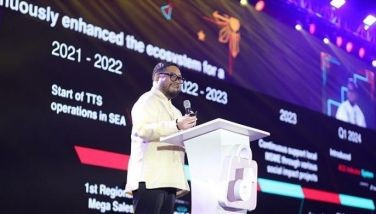A different path

JAKARTA — In 1985 when Noor Huda Ismail was 12 years old he was sent by his father to Al Mukmin Ngruki, an Islamic boarding school in Ngruki, a suburb of Surakarta city in central Java. Noor was away from home for six years, spending his impressionable teenage years in the school.
Al Mukmin, or Ngruki as Noor refers to it, was no ordinary Indonesian school. Its hallways were adorned with photographs of AK-47s. Noor recalls Arabic calligraphies hanging on a dormitory wall that said, “Die as a noble man or die as a martyr.”
The school was founded in 1972 by Abdullah Sungkar and cleric Abu Bakar Bashir (or Abubakar Baasyir, as Noor spells it), tagged by Indonesian authorities as the spiritual leader of the Southeast Asian terror cell Jemaah Islamiyah (JI).
Ngruki has been described as JI’s “Ivy League.” Among its alumni was Fathur Rohman Al-Ghozi, the convicted terrorist implicated in the Rizal Day bombings in Metro Manila that killed 22 people. Al-Ghozi escaped from Camp Crame on a day when the prime minister of Australia was in Manila, but was later shot dead.
Noor reports that Ngruki students underwent terrorist training in camps in Afghanistan and at Camp Hudaibiyah in the Philippines. One of Noor’s classmates, who would later be arrested and indicted for serving as a money conduit for the Bali bombings, also trained in the Philippines. Another alumnus who trained in Afghanistan reportedly served as liaison between Bashir and Osama bin Laden. Other alumni have been arrested in connection with JI attacks in Southeast Asia. Among the teachers at Ngruki was Riduan Isamuddin, alias Hambali.
Six years of indoctrination did not work on Noor, a native of Yogyakarta. He took a different path and became a journalist, taking courses on security in Britain and working for The Washington Post as a correspondent based in Indonesia.
In 2003 he attended a press conference of Bashir, who by then stood accused of ordering the Bali bombings that killed 202 people. Listening to the incendiary extremist rhetoric, Noor recalls murmuring to himself, “My God, what has happened to this man?”
Some of his fellow alumni must be asking the same question about Noor. Last Wednesday he addressed us here as part of the Asia-Pacific Regional Media Program on journalism at the intersection of politics, religion and culture. Noor told us that Ngruki alumni considered him “an extension of American interests… the darling of the West.”
“It took me a lot of time to be objective and balanced about this thing,” Noor told us. “I had to write about my own friends. It was very difficult for me.”
His compelling life story makes him particularly receptive to calls from certain quarters for mass media to serve as a bridge between cultures and help reduce misunderstandings that lead to deadly conflict.
* * *
The keynote speaker in our program, which is hosted by Indonesia and sponsored by New Zealand with support from the European Union and Norway, was Ali Alatas, Indonesia’s top diplomat from 1988 to 1999.
Alatas briefed us on the Alliance of Civilizations that was launched in 2005 by Kofi Annan, at the time the United Nations secretary general, in response to an initiative of the leaders of Spain and Turkey.
The alliance, Alatas told us, “reflects a broad consensus among civilizations, cultures and religions that all nations and all societies are interdependent and bound together in their development, security and economic well-being.”
A report prepared by a high-level group of 20 eminent persons drawn from all over the world, meant to guide the alliance effort, rejected the theory of an inevitable clash of civilizations, and the view that religion drives extremism and terrorism.
“But as so many recent conflicts in various parts of the world have shown, religion has been exploited to justify intolerance, violence and even the taking of life,” Alatas said. “The major challenges to building greater cross-cultural harmony are in particular to be found in the political and economic domains.”
Alatas identified four areas or activities that could play a crucial role in reducing cross-cultural tensions and misperceptions: education, migration, the youth and mass media.
* * *
Noor Huda Ismail has a personal stake in seeing the end of extremism in his country.
He emphasized to us that he was not the only alumnus of JI’s Ivy League who proved immune to terrorist indoctrination and went on to pursue a benign career.
Noor is still not sure how he wandered off the terrorist path. He is a Muslim who prays five times a day; he hopes one day to make the pilgrimage to Mecca. But he drinks and pals around with non-Muslims including Jews.
Noor describes his family as secular. His Muslim father was raised by an elder brother who had married into a Catholic family. His mother was descended from a Javanese family whose patriarch was a puppet master.
Only much later did Noor find out that his father, a parole officer, sent him to Ngruki not for terrorist indoctrination, but so the father could learn more about the school from where many of the criminal offenders he encountered had studied.
In 2005, Noor himself interviewed Abu Bakar Bashir at Cipinang Prison in this city. The aging cleric, Noor recalled, was accompanied by JI member Abdul Jabar, who had admitted blowing up a van filled with explosives at the Jakarta home of the Philippine ambassador in 2000.
Bashir was sentenced to only 30 months and is again a free man.
This week Noor attended the funeral for Amrozi, one of the three JI members executed early last Sunday for the Bali bombings. He was stunned, Noor told us, that there were people at the funeral who found Amrozi’s life inspiring.
Like much of the rest of Indonesia, Noor is bracing for possible retaliation by JI for the executions. And he is hoping that the path he has taken can help bring peace to his land.
- Latest
- Trending




















